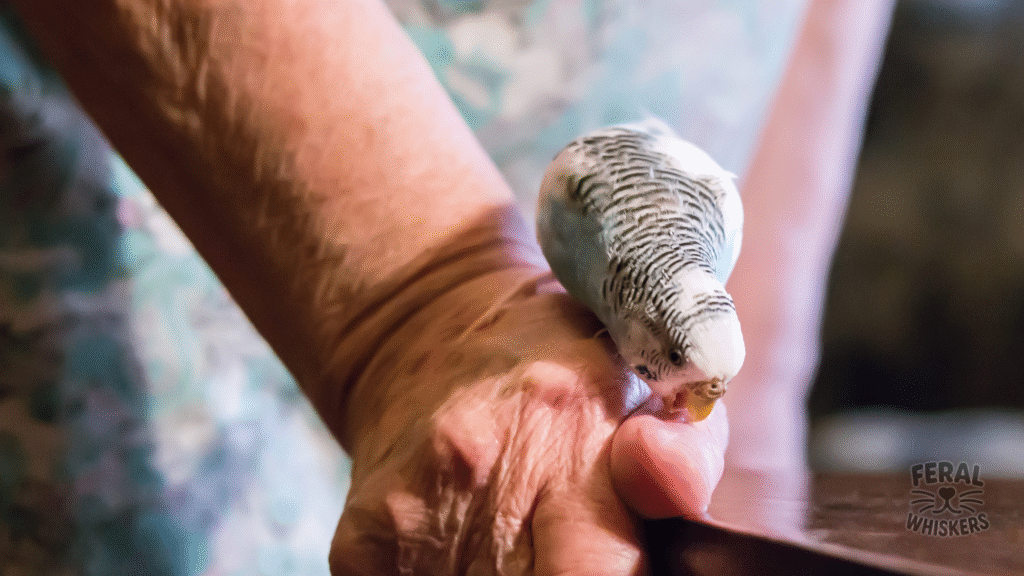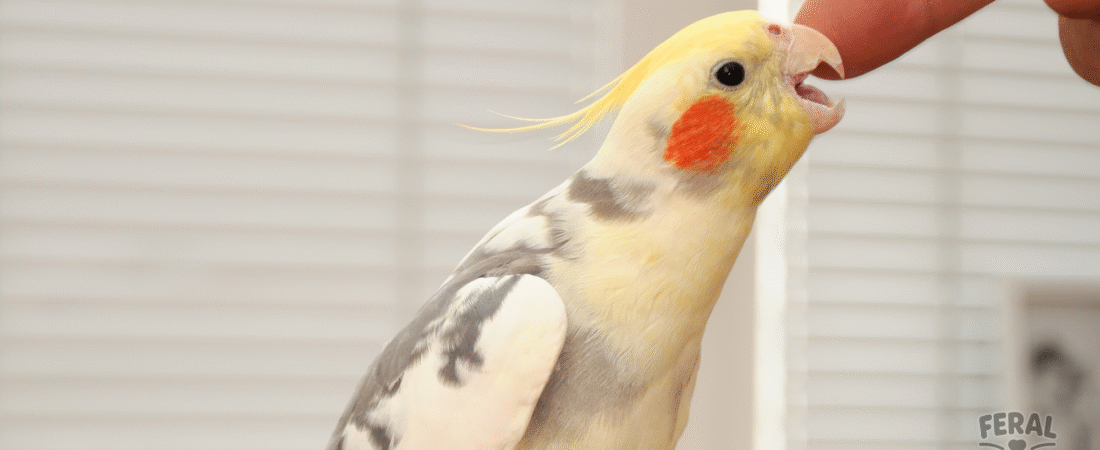Introduction: The Truth About Bird Bites

Almost every bird owner, whether you have a cockatiel, parakeet, conure, or larger parrot, eventually experiences the dreaded nip — or worse, a painful bite. While it can feel personal or alarming, biting is actually a form of communication.
Birds rarely bite just to be “mean.” They use their beaks to explore, to test, and to protect themselves. Understanding why birds bite is the first step to correcting the behavior and building trust.
1. Why Do Birds Bite? Common Causes
1.1 Fear or Lack of Trust
- A bird that hasn’t learned to trust humans may use biting as self‑defense.
- Rescues and rehomed parrots often bite more due to past trauma.
1.2 Territoriality
- Birds may guard cages, toys, food bowls, or their favorite human.
- Hormonal birds (especially during breeding season) are more likely to bite when defending space.
1.3 Overstimulation
- Excited playtime, rough handling, or being touched in sensitive areas can overwhelm birds.
- Like toddlers, they don’t always know how to “turn off excitement.”
1.4 Miscommunication
- Birds give body language warnings (flattened feathers, pinned eyes, open beak). If ignored, a bite follows.
1.5 Hormonal Changes
- Springtime triggers mating hormones — increased aggression is common in both males and females.
1.6 Curiosity & Beak Exploration
- Parrots use their beaks like hands — to test, climb, and explore. Not all beak pressure = aggression.
1.7 Illness or Pain
- Birds in pain often bite if touched near sore spots (feet, wings, abdomen).
- Sudden biting from a usually gentle bird should raise red flags for a vet check.
2. What NOT to Do When a Bird Bites
✘ Don’t yell or hit — this breaks trust and increases fear.
✘ Don’t punish — birds don’t connect punishment with the bite; they only learn you are unsafe.
✘ Don’t shake your hand/arm — the bird may fall and injure itself.
✘ Don’t force interaction when your bird clearly wants space.
3. Gentle Solutions: Correcting Aggressive Behaviors
3.1 Read and Respect Body Language
- Learn your bird’s signals: pinned eyes, raised crest, lunging stance = “Back off.”
- Respect warnings instead of waiting for a bite.
3.2 Positive Reinforcement Training
- Reward calm behavior with treats, praise, or scratches.
- Practice short “step up” sessions — never force.
- Ignore attention‑seeking nips, but reward gentle beak touches.
3.3 Build Trust Daily
- Sit near cage and talk softly.
- Hand‑feed millet or treats through bars.
- Move slowly — sudden movements trigger fear bites.
3.4 Manage Environment
- Rearrange cage toys often to prevent territorial defense.
- Let birds have “out of cage” play areas away from food bowls.
- Provide safe perches and play stands so they aren’t forced into constant handling.
3.5 Address Hormones
- Limit daylight hours (cover cage earlier during hormonal season).
- Avoid petting birds along the back or under wings (can trigger mating responses).
- Remove nest‑like spaces (boxes, dark corners).
3.6 Socialization and Enrichment
- Boredom = frustration = biting.
- Provide foraging toys, shreddables, and varied playtime.
- Rotate toys weekly for novelty.
4. When to Seek Professional Help
- Repeated, severe biting despite training.
- Aggression escalating beyond control.
- Signs of medical problems: weight loss, lethargy, changes in droppings.
- Severe phobias or trauma behaviors in rescued parrots.
Contact a Certified Avian Behaviorist or an Avian Veterinarian for personalized guidance.
5. FAQs
Q1: My cockatiel bites my finger when I offer it to step up. Why?
Likely fear or mistrust. Start by offering a perch or treat instead, and build positive experiences.
Q2: My parrot bites when I clean its cage. What do I do?
That’s territorial guarding. Remove the bird to a play stand before cleaning.
Q3: Do parakeets bite as much as larger parrots?
Yes, all birds can bite, but smaller bird bites are less severe. The principle is the same — identify the cause.
Q4: My bird nibbles gently on my finger. Is that biting?
Not necessarily. Light beak exploration (“beaking”) is how birds test objects. Only hard, painful pressure is true biting.
Q5: Will trimming a bird’s wings stop biting?
No. Wing clipping may limit flight, but it does not solve aggression and can increase stress.
Q6: Do birds bite more when hormonal?
Yes. During mating season, even tame birds may become moody or protective. Adjust care routines accordingly.
Q7: Should I put my bird back in the cage after it bites?
No immediate punishment. Calmly set them down on a neutral perch/stand instead of making the cage a “jail.”
6. Fun Facts About Beaks
- Parrot beaks are made of keratin, like human fingernails.
- Birds constantly grind their beaks to keep them sharp and healthy.
- Beak “crunching” (gentle grinding sounds) usually means a very content and sleepy bird.
- The beak is packed with nerves — which is why bites hurt so much!
Final Takeaway
Bird biting is almost always communication, not aggression for aggression’s sake. By learning to read your bird’s body language, respecting boundaries, and using positive training, you can reduce nips and prevent serious bites.
Remember:
- Bites are the last resort after ignored warning signals.
- Trust is the cure. Punishment is never the answer.
- A happy, understood, and enriched bird is a gentle bird.
Building patience, empathy, and consistency will transform biting battles into a stronger, lifelong bond.

